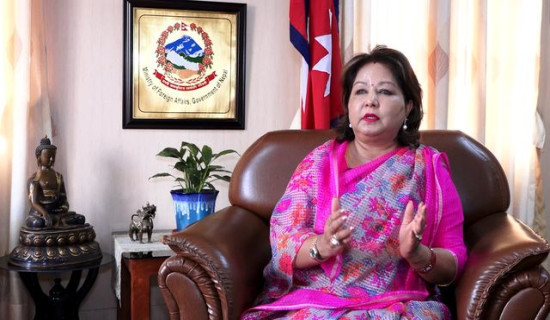- Saturday, 10 May 2025
War casts shadow over every aspect of life in Israel
Tel Aviv, Israel, Oct. 6: At a busy Tel Aviv entertainment district, diners spill into outdoor seating and clink glasses as music fills the air. There’s laughter, there’s life. But all around the patrons, staring down from lampposts and shop windows, are pictures of hostages held in Gaza, stark reminders that Israel is at war and forever scarred by the deadliest attack in its history.
As Israel's war with Hamas reaches its one-year mark, it can seem on the surface that much of life in the country has returned to normal. But with many still reeling from Hamas’ Oct. 7 attack, hostages remaining in captivity and a new front of warwith Hezbollah in the north, many Israelis feel depressed, despondent and angry as the war stretches into its second year.
Uncertainty over the future has cast a pall over virtually every part of daily life, even as people try to maintain a sense of normalcy.
“The conversation about the situation is always there," said activist Zeev Engelmayer, whose daily postcard project featuring illustrations of hostages or Israel's new reality has become a fixture at anti-war protests. "Even those who are sitting in coffee shops, they’re talking about it, in every single situation I see it. It’s impossible to get away from it. It has entered into every vibration of our life.”
Hamas' attack in which some 1,200 people were killed and 250 kidnapped shattered Israelis’ sense of security and stability in their homeland.
Many have been rattled by the war's evolution. Nearly 100 hostages remain in Gaza, with less than 70 believed to be alive. Israelis have experienced attacks — missiles from Iran and Hezbollah, explosive drones from Yemen, fatal shootings and stabbings — as the region braces for further escalation.
They've watched as Israel is accused of committing war crimes and genocide in Gaza and becomes increasingly isolated internationally.
“I’m almost 80 — we grew up in this country with a feeling that we have short wars, and we win them quickly,” said Israeli historian Tom Segev, who described new feelings of utter hopelessness. “We’re not used to a long war.”
Israelis have long harboured a sense that their country, born of the Holocaust's ashes and surviving a panoply of regional threats, is a success story, Segev said. They've strived, he added, for a normality akin to that of European and North American people, though their reality for decades has been anything but.
“I think that history is going backward,” he said of the past year. “Everything we have achieved on our way to becoming a normal state isn’t happening.”
Reminders are everywhere. At a Hebrew University graduation in Jerusalem, a large yellow ribbon was placed in front of the stage. A graduate who didn't attend because his brother was killed in Gaza the previous day was honoured.
Israel's longstanding internal divisions briefly eased in the aftermath of Hamas’ attack, but have only intensified since. Weekly protests calling for a cease-fire deal that would free hostages are attended mostly by secular Jewish Israelis who oppose Prime Minister Benjamin Netanyahu and his government.
According to a September poll by Jerusalem-based think tank Israel Democracy Institute, 61 percent of right-wing Jewish Israelis — Netanyahu's base — support the war continuing.
Occupied with their own trauma, most Israelis paid scant attention to the ongoing destruction in Gaza, even as the Health Ministry there put the Palestinian death toll at more than 41,000. Israeli media have reported little on the devastation. Israelis calling for a cease-fire are driven overwhelmingly by the hostages' plight.
Many Israelis are furious at leaders and the military for not preventing Hamas’ attack. Tens of thousands of people are expected at an alternative ceremony marking one year since then, as a statement against the government's official commemoration. The state ceremony is being prerecorded without a live audience, in part because of fears of heckling and disruptions. (AP)
















